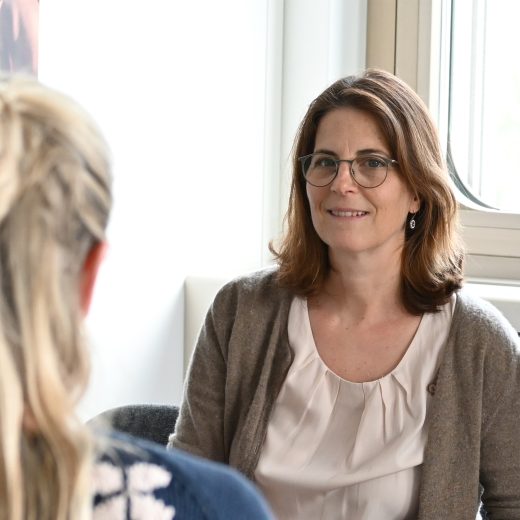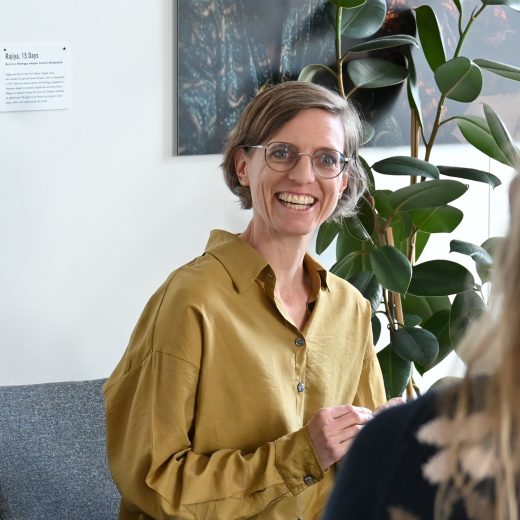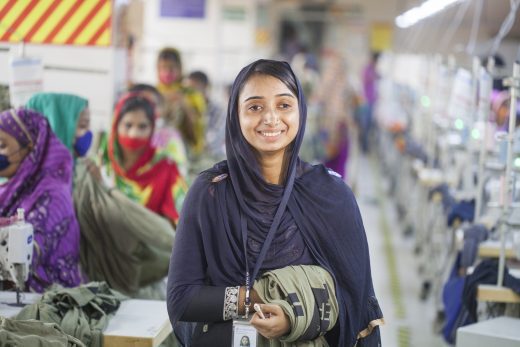Sandra Groth and Deborah Schmidiger are experts for child rights and business at Save the Children Switzerland. They help companies to take responsibility for how their business activities impact children with knowledge, experience and a clear goal: preventing child labour and defending child rights.
Deborah Schmidiger (left) and Sandra Groth (right) work at Save the Children Switzerland as experts on children’s rights in business.
Why we do what we do
Sandra, Deborah – what brought you to this topic? Was there a moment in particular that changed you?
Sandra:
Before I started working at Save the Children, I worked in sustainability departments at large retailers for many years – including with a focus on labour and social standards in the supply chain. Shortly after starting my first job, I travelled to India on behalf of a colleague who was ill. This trip was a turning point for me. The poverty there, the many children I saw begging – it deeply affected me. At the same time, it showed me how urgently we need to act. I knew then that I wanted to do my part to improve the living standards of children.
Deborah:
I have worked in the field of social sustainability for more than 15 years. I became interested in the connections between business and human rights – and child rights in particular – during my time at university. In my work for the Swiss government and the United Nations, I learned about this topic from different perspectives. All of these different experiences have increased my awareness and shown me that there are no simple solutions – but there are many ways for us to make a change together.
Child rights in global supply chains – challenges and risks
What do you see as the greatest challenges for companies?
Sandra:
Child labour is often hidden – and, unfortunately, standard audit approaches often result in child labour being pushed even further down in the supply chain. Many companies believe their supply chains are “clean” because they don’t see anything. But that is precisely the problem.
Deborah:
Plus, companies have to meet a wide range of sustainability requirements. Social criteria are often given lower priority than ecological criteria. They are harder to grasp and quantify, and there tends to be a lack of information and knowledge about this topic.

Child labour is often hidden – and, unfortunately, standard audit approaches often result in child labour being pushed even further down in the supply chain.
What kinds of risks are often overlooked?
Sandra:
As long as the underlying causes of child rights abuses are not addressed – poverty, lack of educational opportunities, insufficient child protection – measures will remain superficial and will not have a lasting impact.
Deborah:
The lowest tiers of the supply chain are especially critical – children who work in the fields or in mines, far removed from control and protection mechanisms. Children in crisis areas, orphans, and children of migrants are particularly at risk.
Are there industries where the risk is particularly high?
Sandra:
According to statistics, agriculture is the worst offender. This is due to the fact that many raw materials – like cocoa or coffee – are produced by smallholders and their families in countries in the Global South. But the risk is also very high in the textile and mining industries – wherever a large number of workers are needed and there are few regulations.
Save the Children as a partner for companies
How exactly does Save the Children help?
Sandra:
Our offer is aimed at companies and other partners – suppliers, farmers and even whole communities. We help create management systems, carry out risk analyses, offer training courses, create guidelines. And we implement programmes on location – to improve access to education, for example, or to strengthen child protection structures in communities.
Deborah:
One specific example is our cooperation with a Swiss cocoa broker in Côte d’Ivoire, where we promote preventive measures in the communities and support children impacted by child labour.
What sets Save the Children apart from other actors?
Sandra:
I think it’s the unique combination of our local presence in more than 100 countries around the world and our business-specific expertise, which is provided in part by our affiliated organisation The Centre for Child Rights and Business.
Deborah:
From my perspective, it’s the combination of direct support for children, families and communities and the fact that we bring this experience into our work with governments – to strengthen national structures, for example, or to adopt guidelines in the areas of education and child protection.

From my perspective, it’s the combination of direct support for children, families and communities and the fact that we bring this experience into our work with governments – to strengthen national structures, for example, or to adopt guidelines in the areas of education and child protection.
Looking to the future – what needs to change
If you look 10 years into the future – what needs to change in business in order to defend child rights?
Sandra:
I would like to see a real shift in terms of awareness. Moving away from a purely “compliance-based” mentality towards active promotion of child rights – not only along the supply chain, but also as a part of corporate responsibility.
Deborah:
Companies need to design their supply chains so that all actors – including farmers and mine workers – can earn a living wage. That would be a major step forward.
And what is the first step for companies that want to start now?
Both (laughing):
Contacting us 😊
Sandra Groth
Sandra Groth has around 20 years of experience in the field of corporate responsibility with a focus on ensuring environmental and social standards in global supply chains. She has been responsible for the topic of ‘Children's Rights & Business’ at Save the Children Switzerland since 2022 and is the contact person for companies that want to act in compliance with the law and positively shape their influence on children and their rights.
Deborah Schmidiger
Deborah Schmidiger has been working in the field of social sustainability and labour rights in supply chains for around 20 years. She has been an expert on children's rights and child labour at Save the Children Switzerland since 2023 and is responsible for building holistic and long-term partnerships with multinational companies with the aim of tackling the root causes of child labour.
How Save the Children supports companies
Protecting child rights in the supply chain
To better protect people and the environment against negative impacts, Switzerland implemented new legal due diligence requirements for companies as of 1 January 2022. This legal development goes hand in hand with comparable, at times even stricter, legal initiatives in other European countries as well as at the EU level. Save the Children can help you to safeguard child rights, reduce liability risks, prevent damage to your reputation, and generate added value for your brand.
